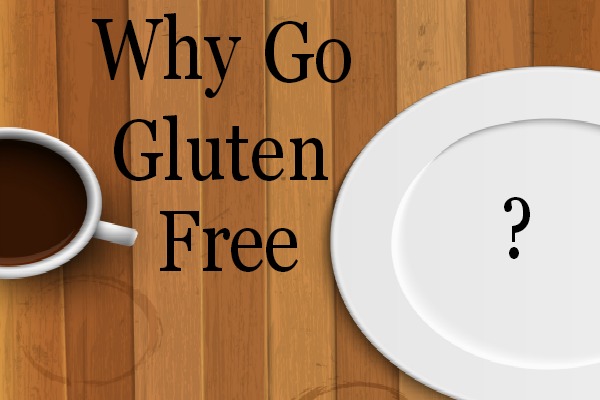Why Go Gluten Free?
If you’ve noticed over the last few years, many people have gone gluten free. But do you know why they’ve made that choice? Do you have any idea what kinds of effects a gluten free diet can have for you? Is it necessary? Is it just a fad? What is gluten anyway?
First of all, gluten is a protein found in wheat. Therefore, gluten is in many packaged products like cookies, crackers, breads (whether store-bought or homemade), all sorts of snack foods (including many kinds of chips), and even in many soups and sauces and dressings. Gluten seems to be nearly everywhere! Gluten is found in so many products because it’s what makes breads soft and spongy and what helps gives many soups and sauces their creamy texture. It’s also found in many flavorings, so it can show up in products that you’d never guess contained gluten.
So is a gluten free diet necessary? That depends. If you have celiac disease, then it is definitely necessary to completely avoid gluten. People with celiac disease are not able to tolerate even the smallest amount of gluten. It causes severe sickness (diarrhea, abdominal pain, etc.) and eventually leads to damage of the intestines as well as other serious health problems.
Other people who don’t have celiac disease can still be sensitive to gluten. That means the symptoms are not as severe, but they are still there. Gluten sensitivity doesn’t lead to the kinds of serious and life-long health problems that celiac disease can lead to, but it still causes the person to feel bad and have gastrointestinal symptoms when he or she eats foods containing gluten.
Another thing that I found out about gluten is that it can lead to chronic inflammation in the body. For many many years, I’ve suffered from severe TMJ pain (pain in my temporomandibular joints—in other words, pain in my jaw joints). My sister began doing research and found that gluten contributes to chronic inflammation. The reason I have TMJ pain is because my jaw joints stay inflamed. I’ve tried every treatment known to man (including surgery) to help lessen the pain, and nothing has worked very well or had any lasting effects. I literally haven’t had a completely pain-free day in the last 10 years. (That may sound like an exaggeration. Unfortunately, it isn’t.)
Just when I had given up and was trying to learn to just live with the pain, my sister told me about her research into gluten and how it contributes to chronic inflammation. I was afraid to even hope that she might be right, but I was certainly willing to try out a gluten free (GF) diet to see if it lessened my pain, and it did!! After completely giving up gluten for just a few weeks, I could already tell a difference. And not only did I have far less TMJ pain, I also felt better in general!
I’m not saying that everyone needs to be on a GF diet. But I am saying that, for some people, a GF diet is very important. For other people, even though it’s not necessary, it can still be very helpful. Some people have reported fewer migraines and more energy from going GF. Others have tried it and haven’t really seen anything change (though there still could be some positive changes going on inside the body). So what I’m saying is that a GF diet may be something to consider if you suffer from tummy troubles, inflammation (like TMJ or arthritis), anemia, low energy, migraines, etc. I’m definitely not a doctor, and you should absolutely talk to your own doctor before making any big changes, but it’s something worth considering.
Next time I’ll cover information about what you should and shouldn’t eat if you’re on a GF diet. Fortunately, more and more companies and restaurants are offering GF options, so it’s not nearly as difficult to eat GF as it was years ago. If you are GF, has it made a big difference in your health or how you feel? Why did you decide to go GF? For those who aren’t GF, are you considering it? Why?
Updated 2 years later: I have now been gluten free for 2 years. After going gluten free a little over 2 years ago and having far less TMJ pain, I decided to do a “test” to see if it really was my gluten free diet that was responsible for the huge decrease in TMJ pain. I ate a few gluten-containing foods over a couple of days, and I very quickly noticed a definite increase in pain. In fact, even though I only ate food containing gluten for a couple of days, the worst (most severe) pain lasted for about 3 days longer. After that, I was in less pain, but it lasted for another week or so. After doing that experiment twice, I was absolutely convinced that the gluten was what was causing the majority of my TMJ pain. I still have damage in my jaw joints and still do experience occasional pain for a day or two, but it’s not nearly as extreme as it was when I cheated on my GF diet. For that reason, I haven’t cheated on my diet for at least 18 months, and I still feel much better and am still completely convinced that being GF is the way to be!










I have been on a GF free diet along with my entire family as myself and my daughter were diagnosed with Celiac in May of 2013. It is hard to stick by and you have to be careful of the companies some say GF free but they can label items GF free if they have less than a certain amount in them so they still might contain small traces of gluten that is ok for the gluten sensitive but not for Celiac. So I have learned so much this last few months. My family of 7 all went GF free in our home to support us and I love it! I never thought about what I placed in my mouth and now I watch everything and I am so glad I didn’t make the rookie mistake either of just buying everything GF I just cook meals from scratch and use healthy recipes. Love it and thanks for this post! (Celiac beware as well gluten is hidden in shampoo’s and other home products)
Thanks so much for your comment, Krista! And how wonderful that your entire family went GF with you! And I completely agree that it’s very important (particularly for those with Celiac disease) to double check everything. Also, your point about cooking healthy foods for your family is a great one! Just because something is GF, it’s NOT necessarily healthy. I’m so glad you enjoyed the article!
Gluten is in mascara & some lip balms as well. There is a website that gives a list of gluten-free make-up, I think it is http://www.glutenfreemakeupgal.com
Also, Paleo researcher Chris Kresser says in his article 50 Shades of Gluten Intolerance there are about 6 elements in wheat that people can have a reaction to. Current Celiac testing only “screens” for 2 of them, which means you can have “normal” results from a Celiac test & still be gluten sensitive. He says people who are gluten sensitive are often also sensitive to the proteins in other grains & the milk protein casein because they are so structurally similar to gluten. You body basically can’t tell the difference & reacts to those as well. So, it may not be enough to stop all gluten – you may need to try stopping all other grains & dairy products.
I have celiac disease, so I have to avoid gluten. The fact that it’s in many shampoos dis surprise me…
Our family has been wheat free for a year not only has my arthritis gone away but my blood sugar no longer crashes causing me to shake and turn into a huge crouch before meals!
Dear Wendy,
Excited to read about your success with TMJ as I have it as well. I was wondering if you applied the GF diet to your child with autism since I have heard about some successes in that area as well.
Sincerely,
John
Yes, my whole family is now gluten free. I did a gluten free diet with my autistic daughter years ago and saw huge improvements in her health. She went from being very sickly and thin and from having tummy problems constantly to being much healthier and having almost no tummy problems at all. Unfortunately, I didn’t see improvements in communication and that sort of thing, but I’ve heard from many other moms whose autistic children made great improvements in those areas after going GF.
I hope your TMJ is much better if you try a GF diet for yourself! I can truly say that this has been the only thing that has given me much relief (other than TMJ surgery that I had 23 years ago) from my TMJ in all of the years that I’ve had it. (I’ve had pretty severe TMJ issues for about 28 years.) I’d love to hear back from you after you give it a try. It may take up to 6 weeks or more to really know how much it will help you, so you have to be patient at first.
Thanks for your comment!
Hi Wendy,
Thank you very much for your timely reply. I have had jaw and pain in teeth and sometimes it is hard to know the origin of the problem. I do believe that it could be TMJ. (Clicking Noise).
In-so-far as the autism issue is concerned, I have a friend whose grandson has this; and I am always looking for a cure or some help. Perhaps the GF Diet offers some hope.
Thank you and God Bless you,
John
This brings me so much hope! I have had bad TMJ for almost 6 years. I’ve had it longer but a car accident put the pain into chronic pain and inflammation. I haven’t had a pain free day since. It’s either the weather, chewing, LED lights, talking…the list goes on. If different food can give me better days than why not?!?!
Thank you for sharing this 🙏.
I’m so glad!! It’s been 8 years now since I first started eating gluten free, and it’s still worth it! The main thing to remember is that you can’t “cheat” and eat just a little bit of gluten. Even if you eat small amounts, it will undo whatever good the gf diet is doing. Once you start feeling so much less pain, though, you’ll find that it’s worth it!